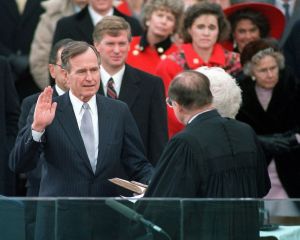By Philip I. Rosenbaum
Associated Press Writer
Guests at George Bush’s inauguration will watch a parade-float replica of his World War II plane, marvel at a 10,000-gallon cowboy hat and salute a rippling 20-by 40-foot American flag.
But A. LeConte Moore’s role won’t be apparent or appreciable to inaugural-goers, unless terrorists attack, the parade floats collapse, thieves steal the cowboy hat or the wind tears the flag off its staff.
As insurance man for the Presidential Inaugural Committee, Moore hopes none of these remote possibilities will ruin the event, protected with special policies arranged by his company, New York-based brokerage Marsh & McLennan Cos. Inc.
“I don’t want claims. I don’t want people to get hurt,” Moore said in an interview. “I don’t want PIC to be sued. I don’t want the insurance companies to have to pay the claims.”
Although the insurance companies providing coverage can’t blame him if there are claims, Moore said he wants to stay on their good side.
“You can always find another client; you can’t always find another insurance company,” said Moore, vice president of the company’s Entertainment & Leisure Division.
Moore is securing policies from approximately 25 other insurers, including the Gulf United Corporation, the Chubb Group and the American International Group. The complete insurance package is said to be costing the committee between $$300,000 and $$400,000.
Moore declined to specify the price tag but described it as “an incredibly cost-effective deal, considering the terrorism right now.”
General liability insurance, Moore’s biggest concern, would cover personal injury in the event of a terrorist attack. Liability covers other contingencies as well, ranging from collapsed spectator bleachers to food poisoning at a post-inauguration cocktail reception.
Moore declined to specify how much coverage is provided, saying disclosure could invite frivolous lawsuits.
“You can get lawyers hovering like wolves around a carcass,” he said.
What happens if Bush is injured? “I doubt the president would sue his own committee,” Moore said.
If inaugural history is any indication, things can go wrong.
Longtime Washington residents still recall when Army troops had to shovel Pennsylvania Avenue after a snowstorm struck on the eve of John F. Kennedy’s inauguration in 1961.
Frigid temperatures in 1985 drove President Reagan’s inauguration indoors and cancelled the parade down Pennsylvania Avenue.
That decision may have prevented lawsuits over frostbite. But the inaugural committee had to offer to return more than $$840,000 to 17,500 parade ticketholders. The event was then insured for liability and property, but not cancellation. Moore has changed that now.
“The PIC wants to be able to say ‘It’s too cold out, we cannot let the parade go on,”‘ he said.
Aside from a few fender-benders from parade-related accidents, no claims were filed in 1985.
The Friday night inaugural gala at the Washington Convention Center is expected to gross about $$9 million from television advertising and ticket sales. The committee will use the proceeds to help defray inaugural expenses, including the insurance.
Aside from terrorism and accidents, the committee also is insured in case the broadcast goes awry, either because of technical problems or because somebody says something on the air that invites a lawsuit.
“If someone’s libeled or slandered during the broadcast or in the audience, and this is a roast, PIC wants to know how they can avoid losses,” Moore said.
Paolo Carega, senior vice president of Marsh & McLennan, said the committee would be reimbursed for expenses plus anticipated proceeds if an unforeseen emergency cancels the TV broadcast.
Aside from workman’s compensation and the fireworks coverage, Carega said, none of the insurance is required by law. But the committee opted to cover itself against most contingencies anyway.
“Each individual type of insurance decision is a business decision as well as a budget decision,” said Kathy Armstrong, the committee’s principal deputy for administrative operations.
The decision to award the account to Marsh & McLennan was made after a competition among four bidders. Carega called it “no doubt the most prestigious account in the country.”

